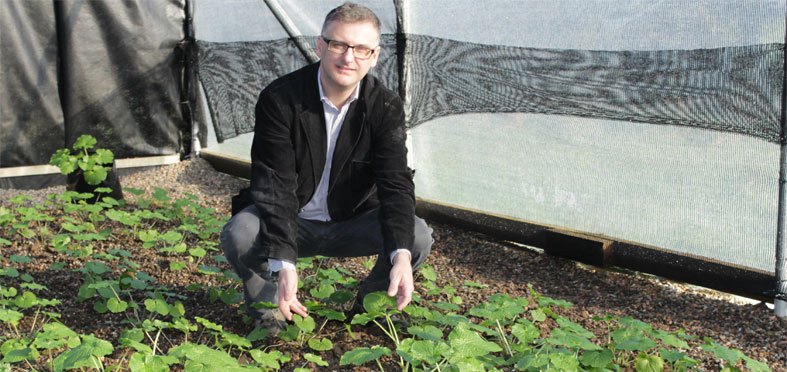From Portadown to downtown Tokyo

Demanding diners in some of Tokyo’s 5,000 exotic sushi bars could soon be enjoying one of Japan’s prized herbs that’s now being grown near Portadown!
Wasabi plants, said to the world’s most expensive and difficult to cultivate – even in Japan – are now sprouting in a huge polytunnel near Laurelvale in Co. Armagh.
Hoping to harvest the benefits of a growing demand from top chefs in Japan and other parts of Asia for wasabi is part-time farmer Dr. Sean Kitson. His day job is in biomedical science in one of Northern Ireland’s biggest pharmaceutical firms. Wasabi is served with sushi either as leaves or grated into a bright green paste.
Dr. Kitson says wasabi is in huge demand because traditional growers in Japan are scaling back in production because of high labour costs involved in the cultivation and processing of the herb that’s usually added to sushi to provide a hot ‘kick”. “Much of the wasabi used today is not produced from the plant but from horseradish. It’s part of the Brassica family, which also consists of horseradish mustard and cabbage.
“Even in Japan, the demand for real wasabi is so high that chefs often use a horseradish paste instead, with little, if any, real wasabi mixed in. What we are nurturing at Laurelvale is genuine wasabi that will appeal to Japan’s discerning sushi chefs,” he adds.
A top local chef is already interested in being able to create original dishes of local ingredients including wasabi from Armagh.
The highly prized herb is generally to be found in the mountain streams of Shizuoka Prefecture, where it grows best with its roots in sparkling, nutrient-rich, running water from the snow-shrouded slopes of the towering Mount Fuji, Japan’s sacred mountain.
Kitson, a father of two, has virtually recreated the exacting conditions in Japan using pioneering hydroponics technology that enables plants to be grown in water. He’s also become the first grower in Europe to germinate wasabi from seeds.
Why did he decide to start growing such a challenging herb in Northern Ireland? “I started growing wasabi to help my son, Zac, fight a serious medical condition,” he says. “I used my knowledge of biomedical technology to research a number of plants and found that wasabi had anti-inflammatory properties for joints and muscles.
“It’s a potent plant that has also been shown to help increase protection against bacterial infections in the body and mouth. Some research suggests the plant can be used to fight cancer and also aid heart health. Wasabi, furthermore, is rich in antioxidants that help to boost the immune system and can aid in removing harmful toxins from the body,” Dr. Kitson explains.
Wasabi cultivation stretches back to the ancient Japanese who were enjoying the spicy plant around 14,000 BC with their fish and seafood.
He’s found the soil in Armagh, Northern Ireland’s ‘Orchard County”, ideal for the for the hundreds of plants he imported last year. The first full-scale harvest of Northern Ireland’s most unusual herb is due next year. “This may seem a long time, but it does take two years to grow top quality wasabi rhizomes, as the stem is known to botanists. The good news, however, is that leaves and stems will be for sale later this year.”
To develop the crop’s potential, he set up Wasabi Crop, a small firm, last year. It’s the only commercial grower of wasabi in Ireland and one of a handful outside Japan.
“The rhizome is the most valuable part of the plant and is used to produce freshly grated wasabi paste that Japanese chefs love. After much research into cultivating wasabi, we have mastered germination and the plants are growing fast. Our wasabi is authentic. There’s a lot of fake wasabi on the market at the moment,” he adds.
Freshly grated wasabi, he continues, can be added to a variety of recipes and other food and drink including ice cream and spirits such as vodka. It has a pungent and hot taste that’s said to be very different from chilli. The wasabi ‘kick’ is a zingy and refreshingly hot flavour. “Wasabi is both a herb and a medicinal plant that provides health benefits due to its key component of allyl isothiocyanate which releases during the grating process. The isothiocyanates enable wasabi to produce associated antibacterial, antimicrobial and antiparasitic properties.”
He continues that it’s a great source of dietary fibre and vitamin C and a provider of vitamin B6 in addition to the elements of calcium, magnesium, potassium and manganese.








